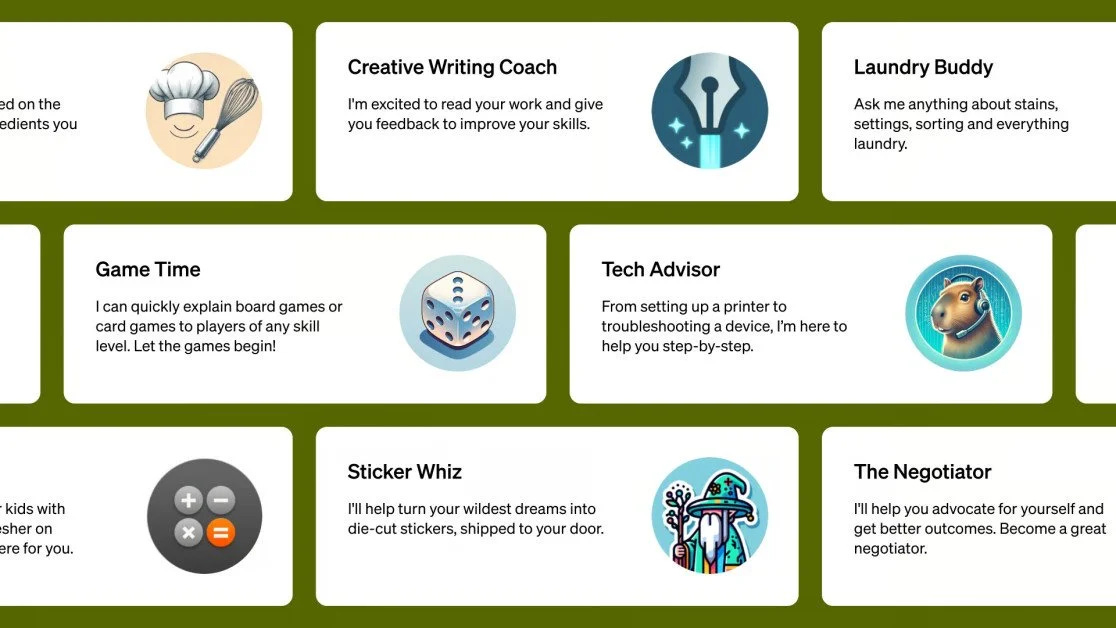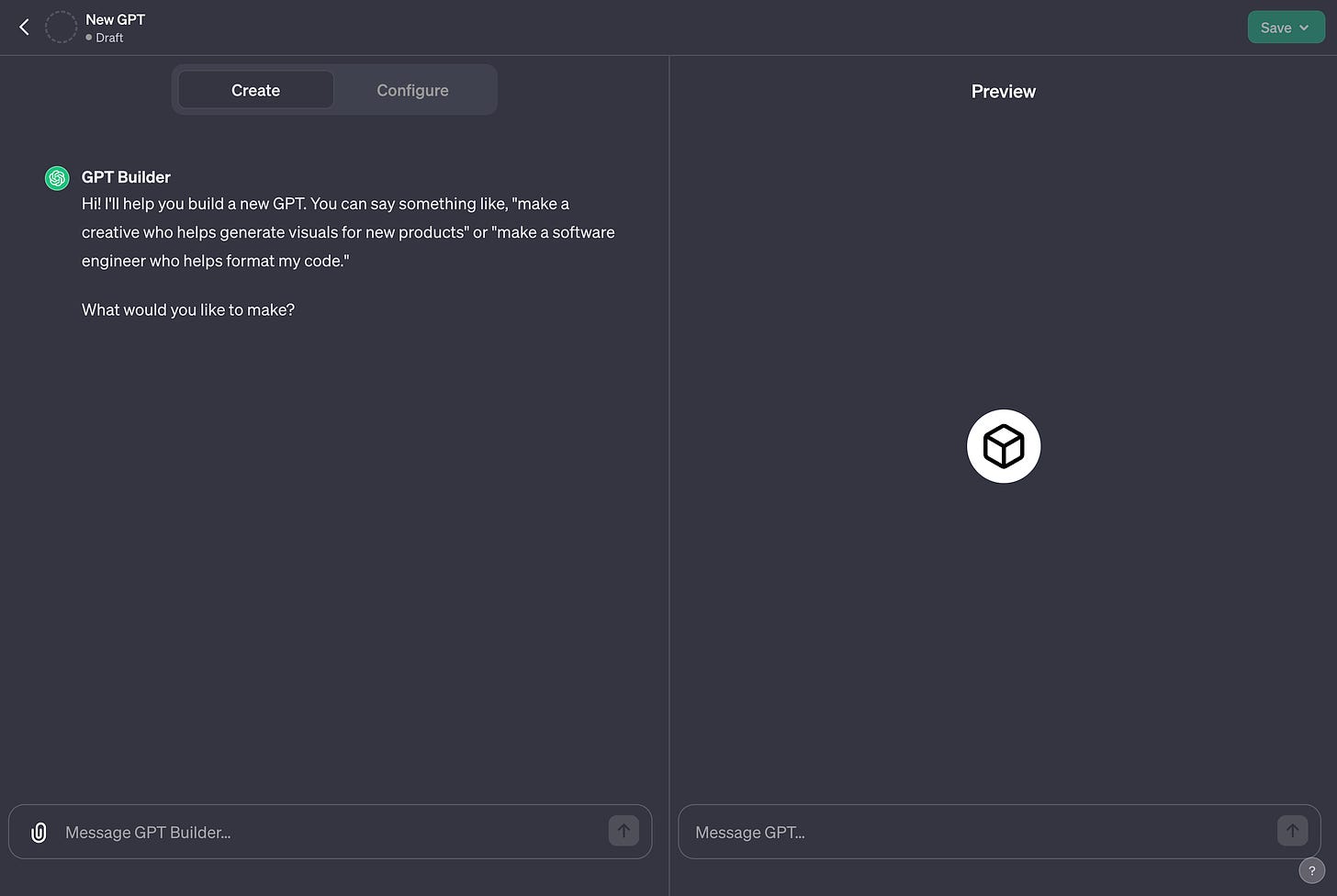What Are OpenAI’s Custom GPTs?
OpenAI has once again positioned itself at the forefront of innovation with the introduction of Custom GPTs.
*OpenAI, the company behind ChatGPT, has had a tumultuous couple of weeks. For a recap of the events that took place, check out my Substack: “Turbulent Times at OpenAI: Timeline of Sam Altman Firing/Rehiring.”
In the ever-evolving landscape of artificial intelligence, OpenAI has once again positioned itself at the forefront of innovation with the introduction of Custom GPTs. These groundbreaking developments represent a significant leap in the field of digital assistance, where the capabilities of ChatGPT are harnessed and refined to cater to specific individual needs and professional demands with unparalleled precision.
Custom GPTs are not just an incremental update to an existing technology; they represent a fundamental shift in how we perceive and interact with AI. They are highly specialized versions of the familiar ChatGPT, but with a transformative ability to be customized into experts in any given field or task. Imagine a digital assistant that's not just a jack-of-all-trades but a master of your specific need, be it SEO research, content creation, or business planning. This level of customization opens up new horizons for personal and professional AI use, tailoring digital companions to the unique contours of our lives and work.
This introduction of Custom GPTs is a testament to the versatility and adaptability of AI. It signifies a move towards more personalized technology, where AI is no longer a one-size-fits-all solution but a customizable tool that can be molded to fit the varied requirements of different users, whether they are entrepreneurs, creatives, students, or just AI enthusiasts. It is also a step towards AGI (Artificial General Intelligence) since it can adapt to completely different scenarios with just a small change in custom parameters.
The Mechanics and Customization of Custom GPTs
At the heart of Custom GPTs lies their extraordinary ability to be tailored to specific tasks and fields. These are not mere iterations of the well-known ChatGPT; they are its advanced counterparts, designed to become adept in virtually any domain imaginable. The customization of these GPTs is a testament to the flexibility and power of AI, enabling the creation of digital assistants that are not just generalists, but specialized experts.
Customizing a GPT is remarkably user-friendly, removing the barrier of technical expertise. OpenAI has streamlined the process, allowing anyone, regardless of their coding skills, to develop their own AI models. This innovation is pivotal in democratizing AI, making it accessible to a wider audience. Whether it's a teacher looking to assist students in understanding complex subjects, a professional aiming to automate certain aspects of their workflow, or an individual seeking assistance in personal projects, Custom GPTs can be the solution, tailor-made to suit their specific requirements.
The process of customizing these GPTs is as simple as engaging in a dialogue with the AI. Users teach the AI the specific tasks or knowledge it needs for a particular application. This intuitive method of ‘training’ opens a new world of possibilities, transforming technology from a mere tool to a customizable extension of human capabilities. With Custom GPTs, AI becomes not just a testament to intelligence but also a reflection of its relevance and adaptability to individual needs.
Step-by-Step Guide for Creating a Custom GPT
Here is an overview on how to create your own GPT from OpenAI, makers of ChatGPT:
Head to https://chat.openai.com/gpts/editor (or select your name and then “My GPTs”)
Select “Create a GPT”
In the Create tab, you can message the GPT Builder to help you build a new GPT. You can say something like, "Make a creative who helps generate visuals for new products" or "Make a software engineer who helps format my code."
To name and set the description of your GPT, head to the Configure tab. Here, you will also be able to select the actions you would like your GPT to take, like browsing the web or creating images.
When you’re ready to publish your GPT, select “Publish” and share it with other people if you’d like.
More at: https://help.openai.com/en/articles/8554397-creating-a-gpt#
Diverse Applications Across Various Domains
Custom GPTs have versatile applications across a range of sectors, each demonstrating their unique capabilities:
Education: Tailoring learning experiences to individual students' needs, Custom GPTs can provide personalized tutoring, facilitate language learning, and assist in complex subjects like mathematics or science.
Healthcare: In healthcare, these AI models can assist in patient education, provide support for diagnostic processes, and even aid in medical research by analyzing vast datasets.
Finance: Custom GPTs can revolutionize finance through enhanced risk assessment, personalized financial advice, and automation of routine customer interactions.
Retail: In retail, these AI agents can personalize shopping experiences, optimize supply chain management, and aid in predictive analytics for market trends.
Creative Industries: For creatives, Custom GPTs can assist in content creation, from writing to music composition, and even offer design suggestions.
Legal Sector: In the legal field, they can assist with document analysis, legal research, and even draft standard legal documents.
Manufacturing: Custom GPTs can enhance manufacturing processes through predictive maintenance, quality control, and optimization of production workflows.
Each of these applications demonstrates how Custom GPTs can be specifically tailored to meet the unique challenges and opportunities within different industries, showing the breadth of their potential impact.
Empowering Creators and Users
The emergence of Custom GPTs by OpenAI is not just a leap in AI technology; it's a movement that empowers a wide array of creators. In this new era, anyone from educators to entrepreneurs can craft specialized GPTs, tailored to their unique needs or areas of expertise. Further amplifying this potential, OpenAI has announced the upcoming launch of the GPT Store. This anticipated platform will serve as a marketplace where these custom AI models can be shared, discovered, and even monetized.
This development marks a significant shift in AI utilization and creation. The GPT Store will provide a space where creativity and practical utility intersect, allowing creators to showcase their AI innovations to a global audience. The platform is expected to foster a vibrant community where the most effective or inventive GPTs gain recognition, perhaps through features like a leaderboard. This not only democratizes the development of AI but also opens up new avenues for creators to gain recognition and monetize their ingenuity.
The introduction of Custom GPTs and the forthcoming GPT Store signal a future where AI is as varied and as specialized as the needs of its users, fostering an ecosystem of AI-driven innovation and collaboration.
Privacy, Safety, and Ethical Considerations
In the realm of Custom GPTs, OpenAI doesn't just prioritize technological advancement; it equally emphasizes the importance of privacy, safety, and ethical considerations. Understanding the delicate nature of data and its implications in AI, OpenAI has implemented stringent privacy controls. These controls ensure that users retain ownership of their data, and interactions with Custom GPTs remain confidential. This approach is crucial in protecting personal and proprietary information, instilling confidence in users about the safety of their data.
The commitment to ethical AI is further reinforced by OpenAI’s comprehensive review system. All GPTs are required to adhere to strict usage policies, a measure that serves as a safeguard against the misuse of AI. This system plays a vital role in preventing the spread of harmful content, ensuring that the GPTs don't engage in fraudulent activities, and mitigating the risk of them being used for unethical purposes.
OpenAI's ethical framework also includes measures to monitor AI models for potential biases and to ensure that they align with legal standards. This is particularly relevant as AI models, including Custom GPTs, reflect the data they are trained on. Ensuring fairness and avoiding biases in AI responses is a key aspect of OpenAI's approach, emphasizing the responsible use of AI.
Furthermore, OpenAI gives builders the autonomy to decide if user interactions with Custom GPTs should contribute to the broader improvement and training of AI models. This level of control underscores OpenAI’s dedication to user trust and transparency, highlighting its commitment to not only advancing AI technology but also ensuring its ethical application.
Through these meticulous safety protocols and ethical practices, OpenAI is shaping a future where AI development is as focused on safety and ethics as it is on innovation and advancement.
Shaping the Future with Custom GPTs
The introduction of Custom GPTs by OpenAI marks a major milestone in the personalization and application of artificial intelligence. These customizable AI entities are set to revolutionize the way we interact with AI, offering tailored assistance for a vast array of tasks, ranging from everyday activities to complex professional challenges. With their user-friendly design, these models significantly lower the barriers to creating and deploying sophisticated AI tools, inviting innovation and expertise from all corners of the world.
The upcoming GPT Store and the potential for monetization it presents are likely to catalyze a new wave of AI-driven solutions, born from the diverse and creative minds of the community. Simultaneously, OpenAI's steadfast commitment to privacy, safety, and ethical considerations ensures that the expansion of AI capabilities is balanced with user trust and ethical standards.
By intertwining real-world applications, democratizing AI development, and enhancing platforms like ChatGPT Plus, OpenAI is not just offering a new product; it's fostering an ecosystem where AI grows in tandem with humanity. In this future, AI will be as varied and specialized as the needs and aspirations of its users, creating a landscape where technology and human creativity coalesce seamlessly.
As we stand at the brink of this exciting new era, it's clear that Custom GPTs are more than a technological advancement; they represent a new frontier in the symbiosis between humans and machines. The journey ahead is filled with endless possibilities, and Custom GPTs invite us all to be part of shaping the future of AI.
We could not close with a stronger statement of confidence than Bill Gates’ in his Nov 9th blog post: “Agents are not only going to change how everyone interacts with computers. They’re also going to upend the software industry, bringing about the biggest revolution in computing since we went from typing commands to tapping on icons.”
Follow on Twitter, LinkedIn, and Instagram for more AI-related content!







